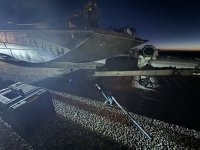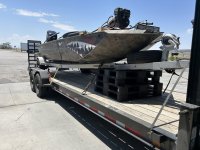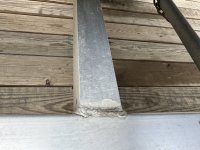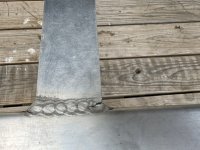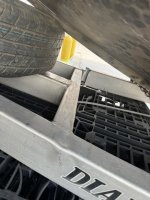You are using an out of date browser. It may not display this or other websites correctly.
You should upgrade or use an alternative browser.
You should upgrade or use an alternative browser.
Trailer failure… clean snap
- Thread starter William Reinicke
- Start date
Yikes
Luckily there was no damage to the boat or persons.
Luckily there was no damage to the boat or persons.
Wow! Looks like it failed right at a reinforcement weld. Those are all-aluminum trailers aren't they? I would think the other side is suspect, I'm guessing you're on top of it already. Is the trailer under warranty?
Paul Taylor
Active member
Nothing a ratchet strap and scrap 2 x 4 couldn't fix. LOL
You must have had the transom straps on too or I'd think the outcome might have been different.
You must have had the transom straps on too or I'd think the outcome might have been different.
William Reinicke
Active member
Not mine. My hunting partner of 11 years is moving far far away and it was the last thing he needed to get. We have been all over the country with this rig and just randomly went pop. Luckily boat is fine and yes everything was strapped in the back. The 115 merc is just fine. There is absolutely no winch manipulation at this point, and when it comes time to pull the boat off and move to another trailer, might be interesting as the winch post is warped all to heck. Good chance we may need to just cut the wench strap to get it loosened, according to what was described. The trailer is absolutely toast. They upsold that aluminum trailer so much when he was buying it, but I have never liked it. Too light and you have to inch it into the water when putting the boat back on, otherwise it floats and jack knifes back to the shore line. Needless to say, hes working on getting a new trailer, the boat is sitting in a tow yard until we get a new trailer. The boat is closer to me than him, so I might be the one going to deal with this mess lol. But what are friends for.... right? Love the guy, happy to help in any way I can. But my god, this would of been the last thing I would of expected. He moved his entire life and family in multiple trips across country. Of course the final pull and this had to happen.
My educated opinion is that this is a stress fracture. One would have noticed the beginning signs of this fracture, if the trailer had been inspected at regular intervals. Most folks never actually "inspect" their trailers. Sure they may walk around the exterior of the rig while the boat is loaded and sitting in their driveway. A person can't see most of the weld seams unless they make a concentrated effort to do so. Usually we just load or unload the boat, go park the trailer and hurry back to the boat, with barely a glance at the empty trailer.We have been all over the country with this rig and just randomly went pop.
I can't begin to count the number of broken or rotten bunk boards I've seen in various parking lots.
Yes, it is fortunate no one was killed or injured when this gave out.
Paul Taylor
Active member
I'm in SC. Aluminum I-beam trailers are all over down here due to saltwater use. Everything on an aluminum trailer should be bolted. I would never buy a welded aluminum trailer, they don't handle stress of bouncing down the highway. I'm guessing that trailer in the picture broke at the weld?
So I've been thinking about it since I saw the post this morning. Last year I bought a 17' boat similar to that in the photo, complete with a surface drive on an aluminum trailer. Not the same trailer manufacturer but very similar. My first thought upon receiving the boat was that it was set up with a lot of tongue weight. Enough that I couldn't budge the trailer tongue by hand, even at 15% of the B/M/T weight that would not have been so. I moved the axle forward a touch to relieve it. I also noticed that the boat in the photo sits quite far forward over and in front of the bunks, as does mine. My thinking is that there is a lot of weight between the bunks and winch, continuous flexing during travel likely caused stress fractures as Dave suggests. I've seen my trailer deflect in the pictured area of failure while hauling the boat, I don't recall that on the many other boat/trailer combos I've owned. But it is my first aluminum trailer. I'm not sure the boat can be safely adjusted rearward on the bunks, but I'm going to consider it.
I've seen my trailer deflect in the pictured area of failure while hauling the boat, I don't recall that on the many other boat/trailer combos I've owned. But it is my first aluminum trailer.
It is never good to have constant flex in a trailer frame, regardless of materials used. I've personally had experience where due to trailer flex, the bow eye was ripped from the boat hull while going down the road.
Sometimes, such flex can be minimized be adjusting the load position. Sometimes it's a minor adjustment that one might not consider to be significant but has significant results. Other times is is simply that the trailer is under built or overloaded.
(excuse some cut and paste but my typing skills suck)
Even in the best conditions, welding causes a degradation in the raw material. This degradation does not occur when you bolt instead of weld. Bolts may loosen or corrode over time, requiring regular inspections and tightening. Welds, on the other hand, do not have the same vulnerability to loosening and are less susceptible to corrosion, provided proper materials and techniques are used during welding. Welding weakens the heat-treated aluminum in the vicinity of the weld, called the heat-affected zone (HAZ), reducing the strength by approximately 40 percent. Any aluminum specifier or designer must account for the weakened state of the welded members.
Either method has advantages and disadvantages. The key is proper engineering on the design end and proper loading/usage on the consumer end.
William Reinicke
Active member
TONS of good info and responses here guys. Thanks a ton, makes me look at my boat trailers a little differently, but none of mine are aluminum. With that said, Ill be the first to admit that I rarely inspect my trailer. Bunks ill inspect twice a year, and Ill kick tires and grease hubs. Never have I ever looked at welds or ran my hand around the frame looking for cracks. So error number 1 on my part.
I want to say we had to make some adjustments to the boat on this trailer. It was a long time ago, but reading about how the boat is loaded and how it can create twisting makes a lot of sense. We have been through 4 excels, and I cannot for the life of me remember if we had to adjust anything on this setup. I want to say we did because when trailering, the bow kept getting caught under the roller. In turn the adjustment left the transom hanging off the back end so that lead to pulling the winch post forward.... again this is a vague memory though. With these moves though, this would result in tongue heaviness which could cause some flex up towards the front of the trailer.
Either way though, thats a terrible design of a trailer, and cannot blame the consumer for making the correct adjustments to make loading and unloading easier. Shouldn't have to fight to put a boat on and off a trailer, so although I understand the points you all are making (and I am in no way disagreeing), but I would think anyone would make the correct adjustments to allow for ease of putting a boat on/off a trailer. The engineering process should of taken this into consideration, which is also a point you all have made in this discussion.
As far as this being a snap at a weld, I cannot say it is or it isnt. I havent actually seen the break and although I have been around this boat for years and years, I couldn't tell you if there is a weld there or not. Why? Because I am definitely that guy that launches the boat, hauls to park the truck and hustles down the boat to the ramp. I pay about 0 attention to the trailer at the boat ramp. What McCann says about welding though makes a ton of sense as well, so it wouldn't shock me if there was a weld near the break.
Thanks for all the replies, this is a lot of good insight and definitely educational, even for myself.
I want to say we had to make some adjustments to the boat on this trailer. It was a long time ago, but reading about how the boat is loaded and how it can create twisting makes a lot of sense. We have been through 4 excels, and I cannot for the life of me remember if we had to adjust anything on this setup. I want to say we did because when trailering, the bow kept getting caught under the roller. In turn the adjustment left the transom hanging off the back end so that lead to pulling the winch post forward.... again this is a vague memory though. With these moves though, this would result in tongue heaviness which could cause some flex up towards the front of the trailer.
Either way though, thats a terrible design of a trailer, and cannot blame the consumer for making the correct adjustments to make loading and unloading easier. Shouldn't have to fight to put a boat on and off a trailer, so although I understand the points you all are making (and I am in no way disagreeing), but I would think anyone would make the correct adjustments to allow for ease of putting a boat on/off a trailer. The engineering process should of taken this into consideration, which is also a point you all have made in this discussion.
As far as this being a snap at a weld, I cannot say it is or it isnt. I havent actually seen the break and although I have been around this boat for years and years, I couldn't tell you if there is a weld there or not. Why? Because I am definitely that guy that launches the boat, hauls to park the truck and hustles down the boat to the ramp. I pay about 0 attention to the trailer at the boat ramp. What McCann says about welding though makes a ton of sense as well, so it wouldn't shock me if there was a weld near the break.
Thanks for all the replies, this is a lot of good insight and definitely educational, even for myself.
William Reinicke
Active member
First time I backed the trailer in so he could put the boat on it. I dumped it like any other boat trailer, sat there and got on my phone. Guess he kept flashing the light bar at me to get my attention. I dont know how long that went on, but I even thought to myself "the he** is taking so long" and then I looked up and realized the trailer had floated back to shoreline and was completely sideways.Ouch!
My old 20' CC was on an aluminum trailer, but was a bolted, not welded, trailer.
Really frustrating when I needed to back way down on particular ramps and the trailer would float!
At that moment I knew I would hate this trailer and would never buy an aluminum one myself.
Ouch!! Good news is nobody got hurt. Looking at the picture Looks like there was a lot of stress on the tongue. I'm would think after all those miles stressing on the tongue the weld just snapped.
I thought i was going crazy the first time I saw mine float up. A buddy of mine didn't believe it until he saw it.First time I backed the trailer in so he could put the boat on it. I dumped it like any other boat trailer, sat there and got on my phone. Guess he kept flashing the light bar at me to get my attention. I dont know how long that went on, but I even thought to myself "the he** is taking so long" and then I looked up and realized the trailer had floated back to shoreline and was completely sideways.
At that moment I knew I would hate this trailer and would never buy an aluminum one myself.
Luckily the ramps with the worst current had courtesy docks on either side and I knew to put the trailer really close on one side of the other depending on if the tide was rising or falling!
William Reinicke
Active member
The new photos may provide clues to why it happened. The bow of the boat is firm on the spare, and a heavy longtail is directly over the bow. Every bump would flex the trailer at the point where it failed. Not saying it was operator error, just something to consider when setting up the next trailer. Those other cracked welds may have opened at the moment of the big bang. Very concerning though, it's hard to think there wasn't progressive failure happening all along. Glad the trailer was the only casualty.
The pictures of the other cracks clearly indicate a progressive failure at all of the locations. Once again, this serves as a reminder for us all, to make regular inspections of our equipment.Those other cracked welds may have opened at the moment of the big bang. Very concerning though, it's hard to think there wasn't progressive failure happening all along.
Ditto, very fortunate indeed.Glad the trailer was the only casualty.


